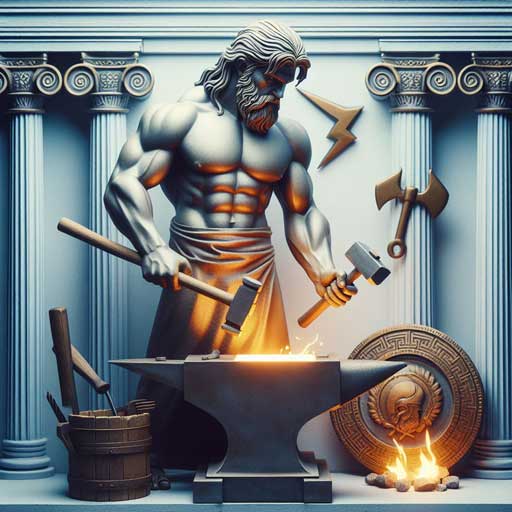Hephaestus, also known as Hephaistos in Greek mythology, was the god of fire, blacksmiths, craftsmen, artisans, metallurgy, and volcanoes. He was one of the twelve Olympian gods, though his appearance and physical abilities were sometimes depicted differently from the other gods.
Here are some key points about Hephaestus:
- Parentage: Hephaestus was the son of Zeus, the king of the gods, and Hera, the queen of the gods. However, there are variations in myth regarding his birth. In one version, Hera bore him alone in retaliation for Zeus's solo birth of Athena. In another, Zeus fathered him without Hera's involvement.
- Appearance: Hephaestus was often depicted as a bearded, strong, and muscular figure. However, he was sometimes shown as lame or physically disabled, which was believed to be a result of being thrown from Mount Olympus by Zeus due to his deformity. This aspect of his character adds depth to his mythological portrayal, emphasizing themes of overcoming adversity.

- Role and Symbols: Hephaestus was primarily associated with the forging of metal, particularly bronze and iron. He crafted magnificent weapons and armor for the gods and heroes, including Zeus's thunderbolts, Athena's shield, and Achilles' armor. His symbols included the hammer, anvil, tongs, and the forge itself.
- Marriage: Hephaestus was married to Aphrodite, the goddess of love and beauty, though theirs was not a harmonious union. Aphrodite was unfaithful to him, often engaging in affairs with other gods and mortals, which caused Hephaestus much pain and humiliation. Despite this, he remained devoted to his craft.
- Myths and Stories: Hephaestus appears in several myths, often as a supporting character. One famous tale involves his attempt to rescue his mother Hera after she was bound by Zeus in punishment for rebelling against him. Another well-known story is his role in creating Pandora, the first woman, as part of Zeus's plan to punish mankind.
- Cult and Worship: Hephaestus had various cult centers throughout ancient Greece, particularly in regions associated with metalworking and volcanic activity. He was often worshipped alongside Athena and other deities associated with craftsmanship and technology.
- Facts: Hephaestus, the Greek god of fire and craftsmanship, interacts with various other gods and heroes throughout Greek mythology, contributing to their stories in significant ways. Here are some notable interactions:
-
Athena: Hephaestus shares a close relationship with Athena, the goddess of wisdom and strategic warfare. Despite being half-siblings, they collaborate on numerous projects, reflecting their shared domain of craftsmanship. One of their most famous collaborations is the creation of Pandora, the first woman, at the behest of Zeus.
-
Aphrodite: Hephaestus's marriage to Aphrodite, the goddess of love and beauty, is marked by turmoil and infidelity. Despite his devotion to her, Aphrodite often betrays Hephaestus with Ares, the god of war. This love triangle results in various myths, including Hephaestus trapping them in a golden net to expose their affair.
-
Ares: Ares, the impulsive and warlike god, is both Hephaestus's brother and romantic rival. Hephaestus's relationship with Ares is complex, as he catches Ares and Aphrodite in their affair but ultimately releases them. However, they occasionally collaborate on forging weapons of war, showcasing their shared prowess in craftsmanship.
-
Hercules (Heracles): Hephaestus plays a crucial role in the Twelve Labors of Hercules. He crafts several items for Hercules, including the golden apples of the Hesperides and the invincible armor worn during the hero's battle with the Hydra. Hephaestus's craftsmanship aids Hercules in completing his legendary tasks.
-
Odysseus: In Homer's epic poem, the Odyssey, Hephaestus is mentioned in the context of the Cyclops Polyphemus, who is his son. When Odysseus and his men encounter Polyphemus, they blind him, prompting the Cyclops to call upon his father for revenge. This episode demonstrates Hephaestus's familial ties and his influence in the mortal realm.
Conclusion: Hephaestus's dynamic interactions with gods like Athena and Ares, as well as heroes like Hercules and Odysseus, reveal his resilience and creativity amidst divine turmoil. Despite challenges, including his deformity and marital strife with Aphrodite, Hephaestus forges a lasting legacy through his craftsmanship and ingenuity, inspiring us to overcome obstacles and leave our mark on history's tapestry.
Overall, Hephaestus played a significant role in Greek mythology as the god of fire and craftsmanship, embodying themes of creativity, skill, and resilience.
Interested In Greek Mythology ? Read more here

